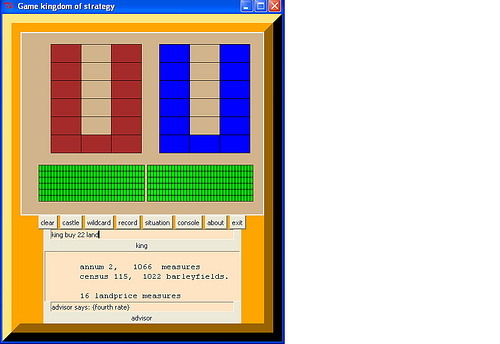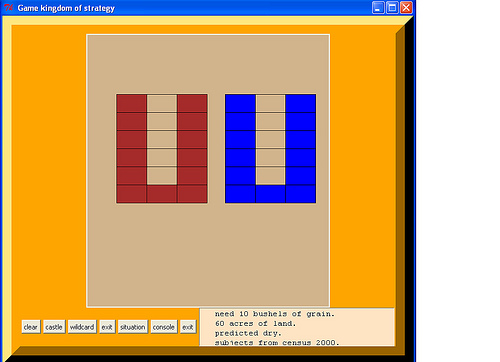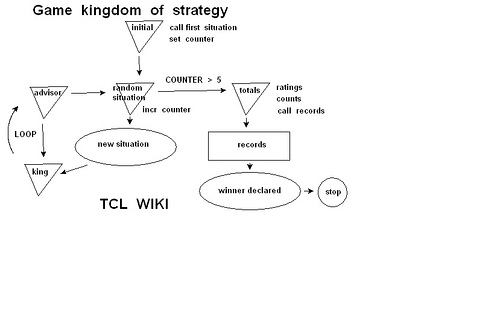Game kingdom of strategy
Game Kingdom of Strategy
This page is under development. Comments are welcome, but please load any comments in the comments section at the bottom of the page. Please include your wiki MONIKER and date in your comment with the same courtesy that I will give you. Aside from your courtesy, your wiki MONIKER and date as a signature and minimal good faith of any internet post are the rules of this TCL-WIKI. Its very hard to reply reasonably without some background of the correspondent on his WIKI bio page. Thanks, gold
- Game Kingdom of Strategy
- session from trial console script
- canvas button operation
- Sample commands from King
- Pseudocode for Endgame
- Dialog from Trial Merge of Eliza namespace
- Screenshots Section
- Figure 1
- Figure 2
- Flowchart for Graphics Version
- Comments Section
- References
- appendix TCL programs
- console version
- Hidden Comments Section
Here is some eTCL starter code for Game Kingdom of Strategy. There is a post on wiki asking for a TCL version of a text and strategy game, originally in basic language. See Ideas for Projects in Tcl/Tk. I am trying to find out the status of the old game. A strategy game can be cobbled from older scraps of Iching_Fortunes code. Using the Iching code, this page presents a trial console version for testing the concept, a console version, and a canvas version with some graphics. The Iching has a good handle on the actions of an ancient kingdom, though in a random scattered pattern. The elements in most adventure games are random generators, castles, tiled game boards, mazes, wildcards, gamepieces, and strategy situation.
The canvas and buttons presented here are largely based on the Simple Canvas Demo by HJG. The random pick algorithm was posted by Suchenworth RS on Horseracing in Tcl. Another source of randomness was A funny cookbook.
In pseudocode, the text adventure game is essentially a three line program in the old style unix wish. In etcl and windows, some buffering may be necessary. One display for response and one display for input would be easier in windows.
1) puts stdout "Please enter your name:"
2) gets stdin name
3) puts stdout "Hello $name"
pseudocode.The user is directed into various possibilities.
2) 3) and 4) are looped.
console show
1)puts stdout "Please enter your name:"
2)gets stdin
pseudocode: analyze name and internal-references
pseudocode : set random situation.
pseudocode : game closes after 5 trials or 5 situations.
3) puts stdout "action $name"
4) pseudocode. return to 2) stdin In the trial deck for console, the advisor would present the situation and the king's responses would have to be a table of abbreviated commands, like buy 200 or sell 300. Otherwise, there would be a lot difficult parsing, like the human language command of computers. The trial deck could call the procedure "advisor" to present the situation derived from random circumstances plague, rat infestation, and weather. The trial deck could call the procedure "king", so the command on the console window would be king sell 20 or king buy 50. This have the advantage of looking as a typical English sentence: subject verb object. In a loop, the king procedure calls on the advisor procedure, which presents a new situation. The king wins or loses based on his responses to the random situation. The game can be closed after a certain number of situation trials by a limiting statement in the advisor procedure. The major subroutines or procedures were diagramed with TKpaint in the flowchart below. Those interested in flowcharting programs should be able to load the flowchart file into TKpaint or else load the file into eTCL with a few canvas display statements.
There are limits on the King for winning the game. The King starts out with 1000 barleyfields and 1000 measures of grain. Each year a census is taken of the planted fields, grain in storage, and inhabitants. The king has effectively two degrees of freedom. 1) the king may either buy or sell barleyfields or, 2) the king may either buy or sell measures of grain. In terms of physics problems, the King, land, and grain are part of a three body problem or three corner problem. Like sitting on a see-saw with three planks, the King is counterbalanced by the stored grain and planted land. Various disasters to the stored grain and planted land operate inversely to the fortunes of the Kingdom. In the internal program, the chances of disaster are carefully set so the King will win in about 1 in 5 sessions. With the random factors set now, the King has about a 20 percent chance of winning and a corresponding 80 percent chance of losing.
The advisor role is part serious helper and part jester. The advisor subroutine presents the results of the census and accounting for the kingdom, together with predictions of weather. The advsor may report various disasters like rat infestation or plague. The advisor has a fairly detailed report of situation and previous years for the king's strategy, when the console report is opened. Only a short advisor gist can be included in the advisor display. Game is halted after 5 years, count > 5, and estimate whether winner conditions are set. Winner is declared if either barleyfields are greater than N1 ( 500) or barley measures are greater than N2 ( 500). A conservative approach as in selling land or buying little land does not work too well, as chances of plague or rat infestation will fall out to ruin the conservative player. Also, staying put with zero buy or sell is not allowed in the game, but a small ante of buy 1 land is allowed. An aggressive approach against bad odds ( called going for broke in Las Vegas) is buying large amounts of land each year and sometimes wins.
For the display of rectangular barley fields, numbers over 100 fields were difficult to register with the eye. With changes in buy or sell land, the display of rectangular fields are rescaled to a representative number. When the King sells land of 100 or so, the gap in the representative fields should be apparent.
The calculation subroutine is the workhorse for creating the random situation and disasters in the kingdom using flag variables. This subroutine makes use of what were called logic condition flags in large Fortran programs. The condition flags are variables with binary values of zero for no or one for positive yes (0,1). In the calculation subroutine, the conditions for the disasters of plague, rat infestation, and starvation are set as 0 or 1 flags. The disaster effects and land prices for each year are estimated from rand() expressions. Later in the subroutine, the flag conditions are used in the calculations for loss of inhabitants and loss of stored grain. For the example code with flag variables below, the rand() statements set a 15 percent chance of rat infestation for the year. These rand() statements are similar to the rand() statements used in the Random Walk Equation Slot Calculator Example.
if { [ expr { rand() } ] <= .15 } {set rat_infest_this_year 1 }
set rat_liters [ expr { $liters*.1*rand() } ]
set rat_liters [ expr { int($rat_liters) } ]
[...many...] set liters [ expr { $liters - $rat_liters*.1*$rat_infest_this_year } ] Once the flag variable for rat infestation is set positive (1), the potential loss of grain in rat_liters for the year is estimated from a random calculation. Notice the potential grain loss for the year is calculated independent of whether the infestation flag is yes or no (0 or 1). Only in the final calculation of grain stores is the loss of grain subtracted, since final grain equals total grain minus ( loss of grain*scale_factor*flag(1) ). The effect is cosmetic, but the flags keep confusion and gritty details out of the final accounting statements. Once the flags are set, the flags can be reported and evaluated at all subsequent points in the subroutine. The flags can even be sent outside the subroutine with possible global statements as, global plague_this_year rat_infest_this_year. In executive decisions, potential loss must be a factor. For example, if the kingdom needs 100 grain liters, then perhaps the order should be grain requirement plus abs potential loss or additional planted fields to assure filled grain bins.
On the clay tablets from the kingdom of UrIII (Sumer circa 2300 to 2400 BCE), the issues from UrIII accounts have some interesting parallels to the Game Kingdom of Strategy. Over a period of several generations in UrIII, the ratio of fallow fields to total fields went from the traditional 50 per cent fallow fields to probably 30 to 20 percent fallow fields. In terms of yearly ratios, the Sumerians went from 1/2 fallow years, (1 of 2) years or (fallow year/(total years)) to possible range of 1/3 to 1/5 fallow years. Also, the recorded barley yield went down probably due to fields salting up. A lot of this evidence is anecdotal; overseers reporting on a group of fields in the lucky clay tablets that survived. Clearly the Kingdom of UrIII was entering a long period of agricultural stress during the last recorded years (circa 2400 BCE).
For comparison, the Hebrew records in the Torah represent a later era and country (Israel circa 650 BCE). In the Torah, the traditional 1 year of fallow in seven years for a field is another peg point (1/7). From the decree of the King Shulgi, the grain harvest in Sumer was taxed at 50 percent to the King (ie. taxes paid in grain). In the Torah, the traditional temple tax was 10 percent (circa 650 BCE), but not sure about the total Hebrew taxes on the inhabitants. However, it is a fair statement that the barley field lands were overtaxed in the last years of UrIII, if not the inhabitants.
Returning to the safer ground of the Game Kingdom of Strategy, it might be worthwhile to open a tax window or input window of fallow field ratios. If the predominant taxes are paid in grain or kind (like Sumer), high grain taxes or low fallow ratios (inversely) would represent an equivalent drain on the grain supply. At the start of the session, a window or label on game display could be set at 1/2, 1/3, 1/5, 1/7, or 1/10 grain taxes or fallow years from the traditional values above. Then the player could go through the usual 5 year cycles and record the wins under the different ratios.
On 27Jul2010, there was a challenge posted on converting Hamurabi.bas to "modern" computer language. The turn-around from other languages (not me!) is fairly impressive. There was a Lua program posted on 28Jul2010, Java on 28Jul2010, common Lisp program on 31Jul210, and Factor program by 3Aug2010. As best of memory, the original Game Kingdom of Strategy was posted starting 1Aug2010, but a long way from completed. Basic code was fairly terse, so there has been some real hoofing on the contributions. As a fortran programmer, I remember basic envy on the basic string addition, let it$ = "be"+"so"
The Game Kingdom of Strategy was compiled on the freewrap TCL compiler for the windows pc. Also, I found a Facebook game called Farmville, with some similar features. Quite possible to add the Eliza namespace to the game. Adding Eliza will get some context sensitive analysis/quirks into the game. Refer to A simple version of Eliza.
session from trial console script
buy or sell, my lord?
starts with 1000 units
answer has form: king buy 20 or king sell 30
1% king buy 20
decision was buy 20, total was 1020.0
advisor: new situation
need 10 liters of grain.
need 60 hectares of land.
predict rain.
subjects from census 5000.
advisor: buy or sell, my lord?
2% king sell 500
decision was sell 500, total was 520.0
advisor: new situation
need 10 liters of grain.
need 100 hectares of land.
predict cold.
subjects from census 3000.
advisor: buy or sell, my lord? canvas button operation
So the order of button actions should be:
push castle
push situation, read advisors' comment
type in king's response in upper entry field
push console
push record, should see record of play on console.
%quit day job
%{advisor:buy or sell, my lord?} {king:get lost}
note: pass or veto should be option
clear to resume playSample commands from King
Commands from the king on the eTCL console
or commands in the king entry field (canvas)
vary on versions, but here are some samples.
initial land is 1000 barleyfields
initial barley is 1000 measures
king buy 22
king sell 100
else
king buy 100 land
king sell 33 land
king buy 222 barley
king sell 33 barley
conditions for winner are very liberal.Pseudocode for Endgame
pseudocode: game is halted after 5 trials, count > 5,
and estimate if (winner) conditions prevail.
pseudocode: if barleyfields > 500 , winner declared
pseudocode: if barley > 500 winner declared
pseudocode: clear resets counter to zero
pseudocode: clear zeros king & advisor entry fields,
pseudocode: & zeros canvasDialog from Trial Merge of Eliza namespace
Refer to [A simple version of Eliza].
Console: king sell 11 barley
1% ::Talk::replyto { barley }
advisor says : Shall we continue?
2% ::Talk::replyto { king sell barley }
advisor says worried about total barleyfields. ?
3% ::Talk::replyto { king sell 11 barley }
advisor says : worried about total barleyfields. ?
4% king sell 11 barley
decision was sell 11, total was land 1000, barley 989.0 Screenshots Section
Figure 1
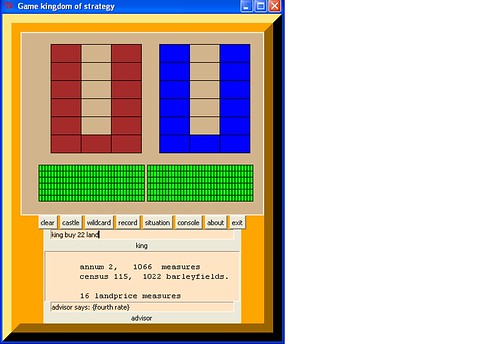
Figure 2
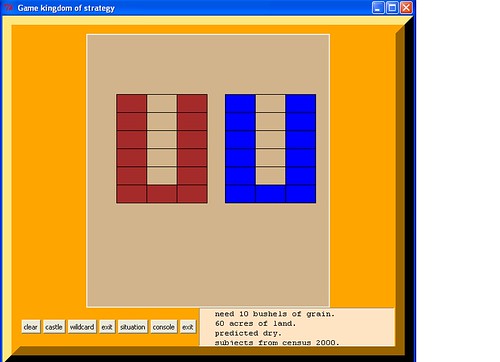
Flowchart for Graphics Version
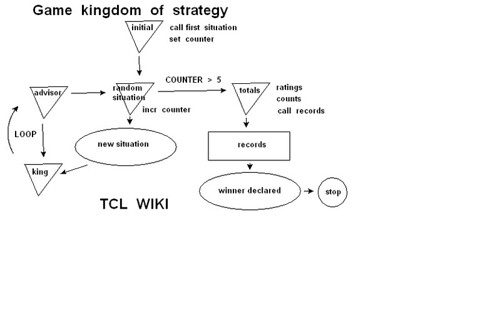
test of offsite image retrieval
Screenshots Section
figure 1.
figure 2.
figure 3.
Comments Section
Please place any comments here, Thanks.
gold Changes.
What is your purpose in binding the motion event on your main window to execute the wm title command. I.e., this line:
bind . <Motion> {wm title . " Game kingdom of strategy "}The result of that binding is that every time you move the mouse, the "wm title" subcommand is called repeatedly. To set the window title, you just need to call "wm title . title" once, not on every event update upon mouse pointer motion. gold changed to bare "wm title . title"
References
- King that learns? A Program That Learns
- Random Walk Equation Slot Calculator Example
- Chinese Fortune Casting Example Demo
- Chinese Iching Hexagrams on Chou Bronzes : TCL Example
- Chinese Iching Random Weather Predictions
- Simple Canvas Demo
- Clock and daylight saving time corrections
- Ideas for Projects in Tcl/Tk
- A funny cookbook
- Tkpaint
- http://mars.netanya.ac.il/~samy/tkpaint.html
- The older tkpaint 1.5 executable that I used was loaded here: [L1 ] [L2 ]
- http://en.wikipedia.org/wiki/Hamurabi
- http://www.dunnington.u-net.com/public/basicgames/HMRABI
- http://www.apollowebworks.com/russell/samples/hamurabi.html
- http://www.cse.lehigh.edu/~munoz/ComputerGameDesignClass/classes/GameTheory.pptx .
- http://en.wikipedia.org/wiki/Hamurabi
- http://en.wikipedia.org/wiki/List_of_games_in_game_theory
- http://en.wikipedia.org/wiki/Game_theory
- http://www.dallasuu.org/re/adult/huumanist/TitTatSagan.pdf
- http://en.wikipedia.org/wiki/Dictator_game
- http://www.hammurabigame.com/hammurabi-game.php
- http://www.codeproject.com/KB/game/Hammurabi.aspx
- http://www.esajournals.org/doi/abs/10.1890/1540-9295(2003)001%5B0367%3AMRAPTB%5D2.0.CO%3B2
- http://ipsnews.net/fao_magazine/indian.shtml
- http://biology.clc.uc.edu/courses/bio104/sci_meth.htm
- http://programmingpraxis.com/2010/07/27/hamurabi-bas/
- http://www.pbs.org/wgbh/nova/nature/plant-vs-predator.html
- http://lisp.pastebin.com/r1gL4zYT
- http://codepad.org/pc8FSfnQ
- http://www.econ.umn.edu/~foster/Handouts%20Games.pdf
- http://re-factor.blogspot.com/2010/08/hamurabi.html
- http://www.moorecad.com/classicbasic/basic/creative/hamurabi.bas
- http://www.cis.upenn.edu/~matuszek/cit590-2010/Assignments/02-hammurabi.html
- http://playtechs.blogspot.com/2009/06/charlemagne-disraeli-and-jefferson.html
- http://www.econ.cam.ac.uk/seminars/Marshall_Lecture/09/marshall_lecture_2_Oct_21.pdf
- http://roseindia.net/java/java-tips/oop/q-hammurabi/q-pr-hammurabi-1.shtml
- http://en.wikipedia.org/wiki/Hammurabi
appendix TCL programs
console version
# pretty print autoindent from ased editor
# trial console operation
# written on Windows XP on eTCL
# working under TCL version 8.5.6 and eTCL 1.0.1
# gold on TCL WIKI , 1Aug2010
console show
proc ? L {
lindex $L [expr {int(rand()*[llength $L])}]
}
if 0 {This is used several times in:}
proc tidings {} {
set a {
{70 liters of grains} {20 liters of grain} {10 liters of grain}
{10 liters of grain} {50 liters of grain}
}
set b {
{400 hectares of land} {60 hectares of land} {50 hectares of land}
{100 hectares of land} {20 hectares of land}
}
set c {rain dry heat cold drought snow }
set d {
{census 1000} {census 3000} {census 2000} {census 5000} {census 8000} {census 4000}
}
return " need [? $a].
need [? $b].
predict [? $c].
subjects from [? $d]. \n"
}
set sumit 1000
proc advisorx {aa bb} {
puts " "
puts "advisor: new situation "
puts [ tidings ]
puts "advisor: buy or sell, my lord? "
}
proc king { aa bb } {
global sumit
if { $aa == "buy" } {set token [ expr { 1.* $bb } ] }
if { $aa == "sell" } {set token [ expr { -1.* $bb } ] }
set sumit [ expr { $sumit + $token } ]
puts " decision was $aa $bb, total was $sumit "
advisorx 50 50
}
puts [ tidings ]
puts "buy or sell, my lord? "
puts " starts with 1000 units "
puts "answer has form: king buy 20 or king sell 30 "Graphics Version
# pretty print autoindent from ased editor
# by gold, Game Kingdom of Strategy
# written on Windowws XP on eTCL
# working under TCL version 8.5.6 and eTCL 1.0.1
# gold on TCL WIKI , 1Aug2010
package require Tk
proc ? L {
lindex $L [expr {int(rand()*[llength $L])}]
}
if 0 {This is used several times in:}
proc tidings {} {
set a {
{70 measures of barleys} {20 measures of barley} {10 measures of barley}
{10 measures of barley} {50 measures of barley}
}
set b {
{400 barleyfields of land} {60 barleyfields of land} {50 barleyfields of land}
{100 barleyfields of land} {20 barleyfields of land}
}
set c {rain dry heat cold drought snow }
set d {
{census 99} {census 100} {census 120} {census 110} {census 120} {census 80}
}
return " need [? $a].
need [? $b].
predict [? $c].
subjects from [? $d].
ans.form:king buy 20 land n "
}
proc lpick L {lindex $L [expr int(rand()*[llength $L])];}
#proc poly args {eval .cv create polygon $args}
set lister { 5 5 6 6 6 6 6 6 7 7 7 7 8 8 1 1 1 1 1 1 1 1 1 }
proc transnumber {lister} {
set choutext [list ]
foreach item $lister {
if { $item == 1 } {lappend choutext \u4E00}
if { $item == 5 } {lappend choutext \u3024}
if { $item == 6 } {lappend choutext \u4E00}
if { $item == 7 } {lappend choutext \u4E00}
if { $item == 8 } {lappend choutext \u3024}
if { $item >= 9 } {lappend choutext ? }
}
return $choutext}
proc advisorcom {lister} {
set choutext [list ]
foreach item $lister {
if { $item == 1 } {lappend choutext "second rate" }
if { $item == 2 } {lappend choutext "fifth rate" }
if { $item == 3 } {lappend choutext "performance comparable to bonzo" }
if { $item == 4 } {lappend choutext "fourth rate" }
if { $item == 5 } {lappend choutext "no bread left" }
if { $item == 6 } {lappend choutext "surving inhabitants have fled" }
if { $item == 7 } {lappend choutext "third rate" }
if { $item == 8 } {lappend choutext "lacking any sense" }
if { $item >= 9 } {lappend choutext ? }
}
return $choutext}
set loser5 0
set counter 0
set sumit 1000
set sumitland 1000
set sumitbarley 1000
proc winnerx {aa bb} {
global sumit sumitland sumitbarley
global sumerians liters winner5
global loser5
puts " end of game "
.zzz delete 0 end
.xxx delete 0 end
.t delete 1.0 end
.t insert 1.0 " end of game "
.zzz insert 0 " end of game "
.xxx insert 0 " end of game "
if { $sumerians >= 120 } {
.zzz insert 0 " king is winner declared "
.xxx insert 0 " king is winner declared "
.t insert 1.0 " king is winner declared "
puts " king is winner declared "
set winner5 1
}
if { $sumitland >= 700 } {
.zzz insert 0 "king is winner declared"
.xxx insert 0 "king is winner declared"
.t insert 1.0 "king is winner declared"
puts "king is winner declared"
set winner5 1
}
if { $sumerians <= 40 } {
.zzz insert 0 "loser declared"
.xxx insert 0 "loser declared"
.t insert 1.0 "loser declared"
puts "loser declared"
set loser5 1
}
if { $sumitbarley <= 300 } {
.zzz insert 0 "loser declared"
.xxx insert 0 "loser declared"
.t insert 1.0 "loser declared"
puts "loser declared"
set loser5 1
}
}
proc advisorx {aa bb} {
global counter
if { $counter >= 5 } {winnerx $aa $bb }
.t delete 1.0 end
puts " "
puts "advisor: new situation "
if { $counter <= 6 } {
.t insert 1.0 [ tidings ]
.zzz delete 0 end
set bl " "
.zzz insert end "advisor:buy or sell, my lord? $bl (for year $counter )"
}
if { $counter >= 6 } {
.t delete 1.0 end }
puts [.t get 1.0 end ]
puts "advisor: buy or sell, my lord? (for year $counter ) "
incr counter
}
set sumerians 100
proc calculation { aa bb cc dd ee } {
global counter fieldsdisplay
global sumitland sumitbarley
global buyland buybarley sumerians
set annum 0
set provisions 1000
set liters 5000
set land 1000
set barleyfields 1000
set landprice 26
set litersperacre 3
set totalmortality 10
set mortalrateer 10
set ratliters 1
set citymortal 5
set landfraction .1
set sumeriansgain 5
set produce 4
set buyland 1
set buybarley 1
set plaguethisyear 0
set ratinfestthisyear 0
set famineyear 0
set immigrantyear 0
set fieldsdisplay 20
if { [ expr { rand() } ] <= .15 } {set immigrantyear 1 }
if { [ expr { rand() } ] <= .15 } {set plaguethisyear 1 }
if { [ expr { rand() } ] <= .41 } {set ratinfestthisyear 1 }
set ratliters [ expr { $liters*.1*rand() } ]
set ratliters [ expr { int($ratliters) } ]
set sumeriansstarved [ expr { $sumerians*.02*rand() } ]
set landfraction [ expr { rand() } ]
if { $immigrantyear == 1 } {
set sumeriansgain [ expr { $sumerians * .05 } ] }
set sumeriansgain [ expr { int($sumeriansgain) } ]
set sumerians [ expr { $sumerians + $sumeriansgain } ]
set produce [ expr { $land * 3 } ]
set landprice [ lpick { 26 25 24 23 22 21 20 19 18 17 16 } ]
set landprice [ expr { int($landprice) } ]
set liters $sumitbarley
set liters [ expr { $liters + $sumitland*.8 } ]
set liters [ expr { $liters - $landprice* $buyland } ]
set liters [ expr { $liters - $sumerians* 7 } ]
set liters [ expr { $liters - $liters*.1*$ratinfestthisyear } ]
set liters [ expr { int($liters) } ]
set foodrequire [ expr {$sumerians*7 }]
if { $liters <= $foodrequire } {
set sumeriansstarved [expr {$sumerians*.2 } ]
set famineyear 1 }
set sumeriansstarved [ expr { int($sumeriansstarved) } ]
set sumitbarley $liters
set sumitland [ expr { int($sumitland) } ]
set sumerians [ expr { $sumerians + $sumerians*.1 -$sumeriansstarved} ]
set sumerians [ expr { $sumerians - $sumerians*.5*$plaguethisyear } ]
set sumerians [ expr { int($sumerians) } ]
set percentfields [ expr { ($sumitland/1000.)*100. } ]
set percentfields [ expr { int($percentfields) } ]
set fieldsdisplay [ expr { 35*$percentfields*.01 } ]
set fieldsdisplay [ expr {int($fieldsdisplay) } ]
if { $fieldsdisplay <= 1 } { set fieldsdisplay 1 }
if { $fieldsdisplay >= 35 } { set fieldsdisplay 35 }
.cv delete landbarley
barley .cv $fieldsdisplay
puts "annum $counter "
puts "$plaguethisyear plague this year, 0 or 1. "
puts "$ratinfestthisyear rats infest this year, 0 or 1."
puts "$percentfields percent fields "
puts " $fieldsdisplay fieldsdisplay "
puts "$sumeriansstarved sumerians starved"
puts "$sumeriansgain immigrated to city."
puts "census $sumerians "
puts "total $sumitland barleyfields."
puts "yielded 3 measures per barleyfield"
puts "rats devoured $ratliters measures."
puts "$liters measures in palace."
puts "land $landprice measures per barleyfield"
puts "how many barleyfields do you wish to buy?"
set listx "
annum $counter, $liters measures
census $sumerians, $sumitland barleyfields.
$landprice landprice measures
$plaguethisyear plague this year, 0 or 1.
$famineyear famineyear ,0 or 1
$ratinfestthisyear rats infest this year, 0 or 1.
$sumeriansstarved sumerians starved
$sumeriansgain immigrated to city.
census $sumerians
total $sumitland barleyfields.
yielded 3 measures per barleyfield
rats devoured $ratliters measures.
$liters measures in palace.
land $landprice measures per barleyfield "
return " $listx "
}
proc king { aa bb cc} {
global sumitland sumitbarley
global buyland buybarley
global counter
if { $aa == "buy" } {set token [ expr { 1.* $bb } ] }
if { $aa == "sell" } {set token [ expr { -1.* $bb } ] }
if { $cc == "land" } { set sumitland [ expr { $sumitland + $token } ] }
if { $cc == "barley" } { set sumitbarley [ expr { $sumitbarley + $token } ] }
if { $cc == "land" } { set buyland $token }
if { $cc == "barley" } { set buybarley $token }
puts " decision was $aa $bb, total was land $sumitland, barley $sumitbarley "
puts " advisor says [ advisorcom [ lpick { 1 2 3 4 5 6 7 8 }]] "
advisorx 50 50
}
set listx [ transnumber $lister ]
proc tactics {w} {
global listx
set yy 100
set font3 {Hevetica 20}
set font5 {Hevetica 150}
set lister { 5 5 6 6 6 6 6 6 7 7 7 7 8 8 1 1 1 1 1 1 1 1 1 }
$w create rect 150 50 250 400 -fill gold
$w create polygon -80 100 -80 70 -50 70 -20 -10 -40 -50 -20 -100 20 -100 40 -50 20 -10 50 70 80 70 80 100 -fill gold -tags figure
$w move figure 150 150
# $w create text 200 400 -text u2617 -tags "text" -fill tan -font $font5
foreach i {1 2 3 4 5 6 } {
$w create text 200 $yy -text [lpick $listx ] -tags "text" -font $font3
incr yy 50
}
}
proc clrcanvas {w} {
global counter winner5
$w delete "all"
.zzz delete 0 end
.xxx delete 0 end
.t delete 1.0 end
set counter 0
set winner5 0
set loser5 0
}
proc leave {w} {
exit
}
proc board {w} {
#set state3 1
set state2 1
clrcanvas $w
. configure -background orange -highlightcolor brown -relief raised -border 30
$w configure -bg tan
}
proc replyit {w} {
global counter
.t delete 1.0 end
.zzz delete 0 end
.xxx delete 0 end
.zzz insert end "advisor:buy or sell, my lord? "
.xxx insert end "king "
}
set keeperer { 1 2 3 }
proc record {w} {
global side2 side1 buy sell
global winner5 loser5
lappend keeperer $side2
lappend keeperer $side1
puts $keeperer
eval [ split $side1 " " ]
set results [ calculation 10 10 10 10 10 ]
puts $results
.t delete 1.0 end
.t insert 1.0 $results
.zzz delete 0 end
.zzz insert end "advisor says: [ advisorcom [ lpick { 1 2 3 4 5 6 7 8 }]]"
if { $winner5 == 1} {
.zzz delete 0 end
.zzz insert end "advisor says: king is winner " }
}
proc reportx {w} {
console show
puts "fifth rate"
puts "performance comparable to bonzo"
puts "surving inhabitants have fled"
puts "mandated poll results"
puts "lacking any sense"
puts "second rate";
puts "no bread left"
puts "third rate"
puts "quit day job"
}
proc castle {w} {
global dx dy fieldsdisplay
set dx 50
set dy 30
set gualisting { 8 8 8 8 8 7 }
set second_hexagram { 8 8 8 8 8 7 }
set colorx black;
for {set i 0; set y 20} {$i<6} {incr i; incr y $dy} {
set colorx brown;
for {set j 0; set x 50} {$j<3} {incr j; incr x $dx} {
set colorx brown;
if { $j == 1} {
if { [lindex $gualisting $i ] == 6} {set colorx tan}
if { [lindex $gualisting $i ] == 7} {set colorx brown}
if { [lindex $gualisting $i ] == 8} {set colorx tan}
if { [lindex $gualisting $i ] == 9} {set colorx brown}
}
$w create rectangle $x $y [expr {$x+$dx}] [expr {$y+$dy}] -fill $colorx }}
set dx 50
set dy 30
set colorx blue;
for {set i 0; set y 20} {$i<6} {incr i; incr y $dy} {
set colorx blue;
for {set j 0; set x 50} {$j<3} {incr j; incr x $dx} {
set colorx blue;
if { $j == 1} {
if { [lindex $second_hexagram $i ] == 6} {set colorx tan}
if { [lindex $second_hexagram $i ] == 7} {set colorx blue}
if { [lindex $second_hexagram $i ] == 8} {set colorx tan}
if { [lindex $second_hexagram $i ] == 9} {set colorx blue}
}
$w create rectangle [expr $x + 180] $y [expr {[expr $x +180 ]+$dx}] [expr {$y+$dy}] -fill $colorx }}
}
proc barley {w fieldsdisplay } {
global dx dy
set dx 5
set dy 10
set gualisting { 8 8 8 8 8 7 }
set second_hexagram { 8 8 8 8 8 7 }
set colorx black;
$w delete landbarley
for {set i 0; set y 220} {$i<6} {incr i; incr y $dy} {
set colorx green;
for {set j 0; set x 30} {$j<$fieldsdisplay} {incr j; incr x $dx} {
set colorx green;
if { $j == 1} {
if { [lindex $gualisting $i ] == 6} {set colorx green}
if { [lindex $gualisting $i ] == 7} {set colorx green}
if { [lindex $gualisting $i ] == 8} {set colorx green}
if { [lindex $gualisting $i ] == 9} {set colorx green}
}
$w create rectangle $x $y [expr {$x+$dx}] [expr {$y+$dy}] -fill $colorx -tag landbarley }}
set dx 5
set dy 10
set colorx green;
for {set i 0; set y 220} {$i<6} {incr i; incr y $dy} {
set colorx blue;
for {set j 0; set x 30} {$j<$fieldsdisplay} {incr j; incr x $dx} {
set colorx green;
if { $j == 1} {
if { [lindex $second_hexagram $i ] == 6} {set colorx green}
if { [lindex $second_hexagram $i ] == 7} {set colorx green}
if { [lindex $second_hexagram $i ] == 8} {set colorx green}
if { [lindex $second_hexagram $i ] == 9} {set colorx green}
}
$w create rectangle [expr $x + 180] $y [expr {[expr $x +180 ]+$dx}] [expr {$y+$dy}] -fill $colorx -tag landbarley
}}
}
proc about {w} {
set msg "Game kingdom of strategy.
from TCL WIKI,
written on eTCL
Normal play sequence for 8 buttons
1) Push castle, initial display.
2) Push situation, advisor's report displayed.
3) type king's commands, no caps.
4) Push record (ie. record kings reply)
5) Return to 3, Push new situation.
6) Console report is optional.
Console report gives detailed history.
Screen copy console to wordprocessor for
game history and strategy analysis.
7) wildcard is optional, traditional game bonus.
8) clear optional, but clears deck for new play.
9) about shows basic commands.
10) exit leaves program.
Cmds from king take form
king buy 33 land
king sell 11 land
king sell 55 barley
king buy 33 barley "
tk_messageBox -title "About" -message $msg
}
#: Main :
frame .f1
frame .f2
frame .f3
pack .f1 .f2 .f3
set maxX 400
set maxY 300
set y 0
set x1 120
set x2 150
set y1 50
set y2 80
canvas .cv -width $maxX -height $maxY -bg tan
pack .cv -in .f1
#set side2 2
button .b0 -text "clear" -command { clrcanvas .cv }
button .b9 -text "about" -command {about .cv }
button .b3 -text "castle" -command {clrcanvas .cv;barley .cv 20; castle .cv; }
button .b7 -text "situation" -command {castle .cv;replyit .cv; advisorx 50 50 }
button .b6 -text "record" -command { record .cv }
button .b4 -text "console report" -command {reportx .cv }
button .b5 -text "wildcard" -command {clrcanvas .cv; tactics .cv }
button .b8 -text "exit" -command {leave .cv }
text .t -width 40 -height 5 -bg bisque
entry .xxx -width 50 -bg bisque -textvariable side1
entry .zzz -width 50 -textvariable side2 -bg bisque
pack .b9 .b3 .b7 .b6 .b4 .b0 .b5 .b8 -in .f2 -side left -padx 2
.f2 configure -bg orange
label .kingx -text "king"
label .advisora -text "advisor"
pack .advisora .zzz .t .kingx .xxx -in .f3 -side bottom -padx 2
focus .xxx
focus .zzz
board .cv
wm title . " Game Kingdom of Strategy "
Hidden Comments Section
| Category Numerical Analysis | Category Toys | Category Calculator | Category Mathematics | Category Example | Toys and Games | Category Games | Category Application | Category GUI |
| Category Development | Category Concept | Category Algorithm | Category Language | programming language | Category Fortran |
